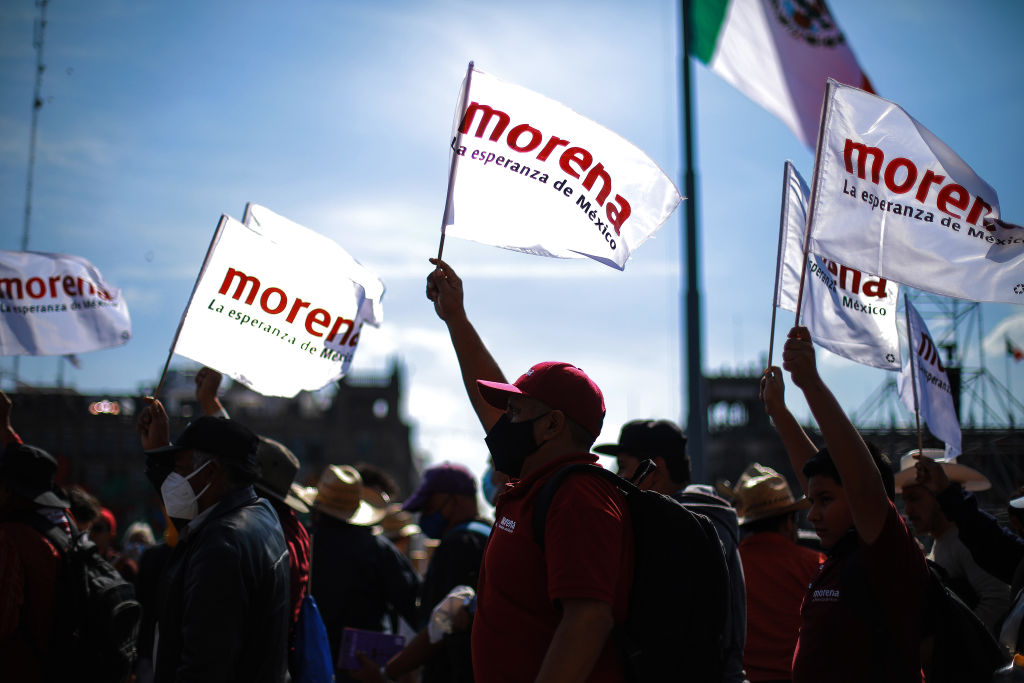MEXICO CITY—With former President Andrés Manuel López Obrador retired in Chiapas, plowing away at his forthcoming books and out of the public eye for the first time in a generation, the party he founded barely a decade ago, Morena, should have fallen apart.
The opposite has been true: The absence of this all-encompassing leader has demonstrated the strength of the apparatus he built. López Obrador hasn’t needed to meddle in government because he left everything ironed out. Everyone knows their job, and they are now carrying it out according to plan (his plan).
The same is true of the party he founded. With 2.3 million registered members and a coalition that got 36 million votes in the June general elections, Morena ranks among the largest political parties in the Western Hemisphere measured by number of members. It is now “the most important movement on the continent,” Camila Martínez, Morena’s communications and propaganda secretary, told AQ.
For years, it has defied observers who predicted infighting and collapse. They said cracks would show once Claudia Sheinbaum was anointed as López Obrador’s successor in late 2023. When Morena held, many bet that the party would tumble once the election’s unifying force was over and then again when coveted government posts went to some members and not others.
Yet, since its landslide victory in June, the party has remained remarkably united, allowing its congressional coalition to steamroll all opposition to its controversial constitutional reforms. Not even Donald Trump’s return has derailed the government’s or Morena’s plans. There will be no changes after Trump’s reelection, said Martínez. “Our government can get along very well with anyone.”
Still, there are cracks, not so much among Morena’s leading lights but between the top brass and rank-and-file. At its heart, this division comes down to how much the party can remain free of corruption and nepotism. To many members,Morena sold its soul to achieve its 2024 landslide victory. “The party has darkened” as it has gained power and money, Esteban Olhovich, a a departamental deputy director in Mexico’s Foreign Relations Ministry, told AQ.
New party, old practices?
When López Obrador won in 2018, he smashed the preexisting party system. Politicians and activists from other parties streamed to Morena, bringing with them the bad old ways of Mexican politics. Both within and outside the party, the accusation that Morena has inherited the political culture of the Institutional Revolutionary Party (PRI), which ran Mexico as a one-party state for 71 years, is constant.
In 2022, the party picked its leadership in a process marred by hundreds of documented fraud, corruption, and malfeasance claims.
An internal faction called the National Morenista Convention arose, demanding a shake-up and guarantees of transparency. However, in 2024, the insurgents opted to postpone their demands until after the elections.
Meanwhile, the party picked new leadership. The top positions were filled without an open contest. This ruffled some feathers, but in exchange, Morena’s new leadership promised to renew the party and return it to democracy.
This new leadership is now striving to earn legitimacy in the eyes of its members, prevent another internal schism, and ensure that infighting doesn’t derail the party’s dominance. There are concerns about nepotism, though, as among them is Andrés Manuel López Beltrán, or “Andy,” as he is widely known, López Obrador’s second son and Morena’s secretary general.
A younger leadership, but not necessarily new
In government, the López Obrador-shaped power vacuum has been filled in by a team of old hands and allies—administratively capable and loyal to obradorismo.
The party’s new leadership, however, is younger, and this renewal has helped to quiet conflict. Morena president Luisa María Alcalde is 37, and Martínez, the communications secretary, is 27. The new leadership has started strong. It adopted the demands of the National Morenista Convention faction. It has also planned rallies across Mexico to re-activate supporters months after a massive presidential campaign.
One aim is to proselytize in favor of the government’s recent reforms. Members are trained in the party’s talking points to confront opponents in face-to-face or online debates. The party’s close to 30,000 activists will be in charge of a much less technological task: distributing millions of copies of Regeneración, the party newspaper.
Leafleting on the streets creates the ideal opportunity for activists to interact with everyday Mexicans. While the public gets pro-government information from a trained party activist, the activist gets first-hand information on what that community wants, likes, and dislikes about the party and the country it runs.
There’s a history of this kind of in-person activity at the party. It is understood that López Obrador went from being a perennial presidential election loser to an unstoppable force by spending his years in the political wilderness visiting each of Mexico’s 2,477 municipalities at least once. Sheinbaum and the Morena leadership have instructed officials, legislators, and party members to continue this kind of permanent campaigning. “Menos escritorio, más territorio.” Hit the pavement, not the books.
All this will facilitate formal party registration, perhaps the most important of the new leadership’s goals. They seek to register new sympathizers and its entire membership from scratch. This mammoth undertaking is designed to get a better picture of who is in the party and help to leave out possible corrupt actors.
The re-registration drive is in the hands of Morena’s secretary general, “Andy” López Beltrán. López Obrador’s second son is the details man behind the scenes. “He’s serious and doesn’t like giving interviews,” said Martínez. “He doesn’t want the spotlight; he wants to organize.”
The coronation of two heirs of the Morena aristocracy – Alcalde is also the daughter of an influential Morena leader of the previous generation, Bertha Lujan – is a calculated risk that even the more skeptical supporters understand. López Beltrán and Alcalde “are the transmission belt connecting to López Obrador,” conceded Olhovich. It allows the party to maintain cohesion while dealing with their leader’s absence. Understanding doesn’t mean support, though: “I don’t like such flagrant nepotism. [The party] needs to promote more of the rank-and-file,” said Olhovich.
Luckily for the party, Morena’s landslide election mitigated any nascent schisms. The victory has created thousands of jobs for government supporters and an enormous party war chest. Mexican parties are tax-payer-funded based on their electoral results, so in 2025, Morena’s budget will reach 4 billion Mexican pesos ($200 million).
Still, members are watching to see whether the new leadership will keep its promise of purging the party of anti-democratic practices. Most say it is still early days for the new administration, but others resent what they feel is a creeping climate of top-down enforcement. At Morena rallies, for example, dissidents and hecklers are scolded by party leaders. In Congress, the party line is vigorously enforced.
“We want to democratize the party,” said Martínez. “The National Morenista Convention is happy,” she added to underscore the credibility of her claim.
For now, the party’s new leaders are viewed as the legitimate heirs to López Obrador, putting them in a strong position. As long as this holds true, millions of Mexicans will continue to root for Morena. They don’t have to deliver on their promises immediately, but the clock is ticking.






